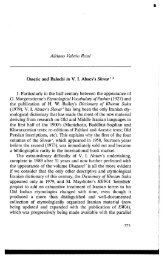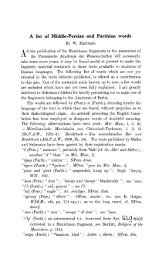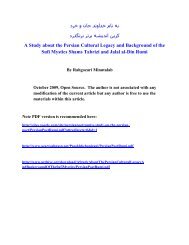Comparative Notes on Hurro-Urartian, Northern Caucasian
Comparative Notes on Hurro-Urartian, Northern Caucasian
Comparative Notes on Hurro-Urartian, Northern Caucasian
You also want an ePaper? Increase the reach of your titles
YUMPU automatically turns print PDFs into web optimized ePapers that Google loves.
<strong>Northern</strong> <strong>Caucasian</strong>, which is close to the earliest date of horse domesticati<strong>on</strong> (around<br />
V mil. B.C.). 326 Thus a Proto-<strong>Northern</strong> <strong>Caucasian</strong> term should have penetrated into<br />
some Indo-European dialects. The place of the borrowing depends <strong>on</strong> the historical<br />
geography of migrati<strong>on</strong>s. At least for Greek as well as for Albanian, which bel<strong>on</strong>ged to<br />
the satPm Eastern Indo-European dialectal group, the possibility of borrowing from<br />
<strong>Northern</strong> <strong>Caucasian</strong> is quite real. If the word was borrowed from <strong>Northern</strong> <strong>Caucasian</strong>,<br />
then the Indo-European -l- (*-ln-) in intervocalic positi<strong>on</strong> is the result of the<br />
accommodati<strong>on</strong> of the original -r- (*-rn-) in the source of the borrowing.<br />
There is a possibility of a distant (and accordingly very old) relati<strong>on</strong> between this<br />
group of words and the Hittite word kurka- “a foal” compared to Greek kÊrnow 327 ,<br />
which might be a comm<strong>on</strong> borrowing from the same <strong>Northern</strong> <strong>Caucasian</strong> stem to<br />
which different suffixes were added in each of the Indo-European dialects. The stem in<br />
<strong>Northern</strong> <strong>Caucasian</strong> might be *gwålV “horse” > Nakh *gile “horse, steed” > Chechen<br />
gila, Proto-Tzez-Khvarshi *guRu > Tzezi gulu “stalli<strong>on</strong>, horse”. 328 The Proto-Tzez-<br />
Khvarshi root could have been the source of both the Greek and Hittite words, with a<br />
characteristic change of voiced into voiceless c<strong>on</strong>s<strong>on</strong>ants depending <strong>on</strong> the rules of<br />
Hittite ph<strong>on</strong>ology. Another borrowing from the same source (but without a suffix and<br />
the diminutive sense c<strong>on</strong>nected to it) might be Latin caballus “work horse” which<br />
ousted the earlier general term in Romance. 329 This word and such dialectal terms<br />
326 As the earliest possible area of domesticati<strong>on</strong> is near the proposed proto-Finno-Ugrian homeland, a<br />
possible link to the Ugrian name for horse reflected in Hungarian ló, Mansi lo(w), Khanty t/law<br />
deserves to be discussed (the Tocharian etymology suggested for the latter does not seem persuasive; see<br />
Napol’skix 1996 <strong>on</strong> a later borrowing in Altaic). It has been suggested (Ivanov 1984) that the Indo-<br />
European term can be traced back to an an earlier compound, the sec<strong>on</strong>d part of which c<strong>on</strong>sisted of this<br />
word cognate to Ugrian *lo and the first of which was the name for “child” spread in different<br />
families, but the weakness of the suggesti<strong>on</strong> is the universal character of the first element, see above <strong>on</strong><br />
Latin puer, Yagnobi pulla-.<br />
327 Forssman 1980; Melchert 1994, 132. It is not easy to c<strong>on</strong>clude whether the words should also be<br />
compared to Iranian terms like Persian and Tadzhik kurra “foal”, since the latter is c<strong>on</strong>nected to the<br />
<strong>on</strong>omatopoetic appeal to address horses: cf. Vakhan kurr-kurr “Come!” in this functi<strong>on</strong> and kurrást<br />
“neighing of a horse”, Griunberg and Steblin-Kamenskij 1976, 371-372, 656.<br />
328 Nikolayev and Starostin 1994, 445-446.<br />
329 On a possible n<strong>on</strong>-Indo-European source in a language of Asia Minor, see Ernout and Meillet 1994, 80.





